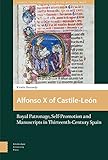Alfonso X of Castile-León : Royal Patronage, Self-Promotion and Manuscripts in Thirteenth-century Spain / Kirstin Kennedy.
Material type: TextSeries: Church, Faith and Culture in the Medieval WestPublisher: Amsterdam : Amsterdam University Press, [2019]Copyright date: ©2019Description: 1 online resource (228 p.)Content type:
TextSeries: Church, Faith and Culture in the Medieval WestPublisher: Amsterdam : Amsterdam University Press, [2019]Copyright date: ©2019Description: 1 online resource (228 p.)Content type: - 9789048541386
- 946.02092
- online - DeGruyter
| Item type | Current library | Call number | URL | Status | Notes | Barcode | |
|---|---|---|---|---|---|---|---|
 eBook
eBook
|
Biblioteca "Angelicum" Pont. Univ. S.Tommaso d'Aquino Nuvola online | online - DeGruyter (Browse shelf(Opens below)) | Online access | Not for loan (Accesso limitato) | Accesso per gli utenti autorizzati / Access for authorized users | (dgr)9789048541386 |
Frontmatter -- Contents -- Acknowledgements -- List of Figures -- Abbreviations -- Introduction: 'the king makes a book' -- 1. Alfonso X, his Literary Patronage, and the Verdict of Historians -- 2. Alfonso in his Texts: literary models and royal authorship -- 3. Reality, Politics, and Precedent in Images of Alfonso -- 4. Codices Laid Out for a King : the appearance and production of Alfonsine manuscripts -- 5. The Circulation of Alfonsine Texts: astrological works and chronicles -- Concluding Remarks -- Manuscript Sources -- Index
restricted access online access with authorization star
http://purl.org/coar/access_right/c_16ec
Today, the literary patronage of Alfonso X 'the Learned' of Castile (1252-1284) seems extraordinary for its time in the context of Europe. His cultural programme, which promoted his royal status and imperial ambitions, was hugely ambitious, and the paucity of information about the intellectual circumstances in which it took place magnifies the scope of Alfonso's achievements still further. This book argues that rather than providing a new cultural template for his kingdoms, Alfonso did little to promote institutional learning and preferred instead to direct the literary works he commissioned to a restricted, courtly audience who would understand the complex layers of symbolism in the representations of him that accompanied the texts. Despite this careful control, this book cites codicological and paleographical evidence to show that some codices traditionally ascribed to the royal scriptorium were copied at the behest of readers beyond the king's immediate circle.
Mode of access: Internet via World Wide Web.
In English.
Description based on online resource; title from PDF title page (publisher's Web site, viewed 02. Mrz 2022)


